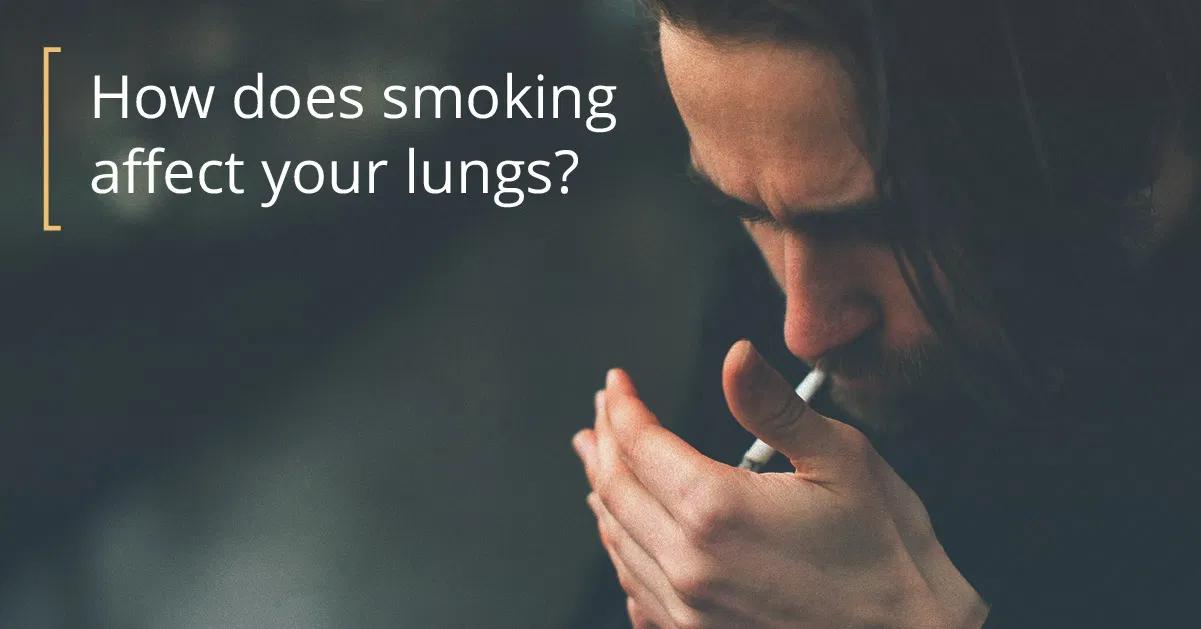Smoking tobacco has long been known to have detrimental effects on overall health, with the lungs being one of the most impacted organs. In fact, a recent report by the U.S. surgeon general attributes nearly half a million deaths annually to smoking. Here, we explore how smoking affects the lungs and the respiratory system as a whole.

How Do the Lungs of a Nonsmoker Function?
The respiratory system of a nonsmoker operates in a specific manner. When air from outside the body enters, it passes through the trachea and then through the bronchioles, which are located in the lungs. The lungs themselves are made up of elastic tissue that expands and contracts as you breathe. The bronchioles bring in clean, oxygen-rich air and expel carbon dioxide. Tiny hair-like structures called cilia line the lungs and air pathways, helping to remove any dust or dirt present in the air you breathe.
How Does Smoking Affect the Lungs?
Cigarette smoke contains numerous chemicals that harm the respiratory system. These chemicals cause inflammation in the lungs, leading to the overproduction of mucus. This increased mucus production puts smokers at a higher risk for conditions such as smoker's cough, bronchitis, and pneumonia. Additionally, the inflammation triggered by smoking can also induce asthma attacks in individuals with asthma.
Nicotine, a substance found in tobacco, paralyzes the cilia. Normally, cilia effectively remove chemicals, dust, and dirt through coordinated sweeping movements. When the cilia are inactive, toxic substances can accumulate, resulting in lung congestion and smoker's cough. Both tobacco and the chemicals in cigarettes alter the cellular structure of the lungs, causing the elastic walls within the airways to break down. This leads to a decrease in the functioning surface area of the lungs, hindering the exchange of oxygen-rich air with carbon dioxide-filled exhaled air. Over time, this can result in a condition called emphysema, characterized by shortness of breath. Emphysema is a common condition among smokers, with the severity of damage depending on factors such as the number of cigarettes smoked and other lifestyle choices. Chronic bronchitis and emphysema together fall under the umbrella term of chronic obstructive pulmonary disease (COPD).
What Conditions are Smokers at Risk For?
Smoking comes with both short-term and long-term consequences. In the short term, smokers often experience shortness of breath, impaired athletic performance, a coarse cough, poor lung health, bad breath, yellow teeth, and unpleasant-smelling hair, body, and clothes. In the long term, smokers are at a significantly higher risk of developing various lung-related illnesses, including lung cancer, COPD, and pneumonia. Approximately 90% of lung cancer cases are attributed to regular smoking, with men who smoke being 23 times more likely to develop lung cancer than nonsmokers, and women being 13 times more likely. Moreover, smoking increases the risk of other cancers, such as those affecting the pancreas, liver, stomach, kidney, mouth, bladder, and esophagus. However, cancer is not the only long-term health issue associated with smoking. Inhaling tobacco also impairs blood circulation, increasing the likelihood of heart attacks, strokes, coronary artery disease, and damaged blood vessels.
How Can Quitting Smoking Affect the Lungs?
Despite the damage caused by smoking, it's never too late to quit. Within days of quitting, the cilia in the lungs begin to regenerate. Over weeks to months, they can become fully functional again. This significant improvement in lung function drastically reduces the risk of developing lung-related illnesses, including lung cancer and COPD. After 10 to 15 years of abstinence from tobacco, the risk of developing lung cancer for ex-smokers becomes equivalent to that of someone who has never smoked.
Smoking has severe consequences for the respiratory system, particularly the lungs. The chemicals in tobacco smoke inflame the lungs, impair the functioning of cilia, and alter the cellular structure of the lungs. This leads to an increased risk of various respiratory conditions, including emphysema, chronic bronchitis, COPD, and lung cancer. Quitting smoking can significantly improve lung health and reduce the risk of developing these illnesses. It's important to prioritize lung health by avoiding smoking and creating a smoke-free environment.
If you want to know other articles similar to The impact of smoking on the respiratory system: effects on lungs you can visit the Smoking and respiratory system category.

